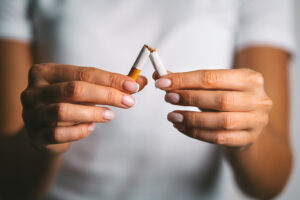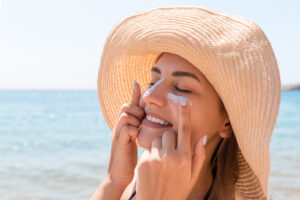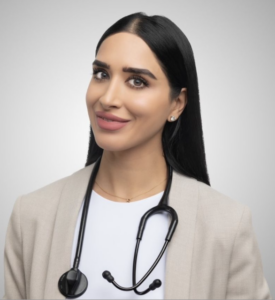Research has shown that around 4 in 10 cancers can be prevented. Healthista spoke to Dr Raj Arora on how we can reduce the risk and help prevent cancer
Cancer is when abnormal cells divide in an uncontrolled way and cancerous cells can often travel through the body and spread to other tissues.
There are more than 200 cancers and 1 in 2 people in the UK will get cancer in their lifetime. There are around 1000 new cancer cases in the UK every day. More than half of new cancer cases in females are breast, lung or bowel cancer.
Red flag symptoms of cancer for women include:
- Change in bowel or bladder habit
- Lumps or thickening in breasts/armpitd
- Unusual bleeding from vagina or post menopausal bleeding/bleeding after sex
- Blood in stools
- Difficulty swallowing
- Tired all the time
- Unintentional weight loss
- Change in a skin lesion
- Coughing up blood
- Shortness of breath
- Vomiting
- Persistent abdominal pain
It is important to seek help if you are at all worried about symptoms that you may have. I usually refer to red flag symptoms of cancer but often patients can see their GP with more general symptoms of not feeling well and this should be equally explored and not discounted.
Prevention
Research has shown that around 4 in 10 cancers can be prevented. So how can we reduce our risk of developing cancer? Not all cancers can be prevented but there are things that you can do to reduce your risk.
In order to understand this, it is important to know the risk factors of cancer and ways in which we can reduce those risk factors. Age, genetics and family history are all risk factors that cannot be changed and can increase our risk of developing cancer.
However, the risk factors below CAN be changed and can help lower our risk.
#1 Stop smoking
Not smoking is one of the most effective ways to reduce your risk of cancer. Harmful chemicals (Carcinogens) from smoking not only impact our lungs but can also have a detrimental effect on the rest of the body.
After 12 years of not smoking, your chance of developing lung cancer falls to more than half that of someone who smokes. After 15 years, your chances of getting lung cancer are almost the same as someone who has never smoked.
READ MORE: How to stop addictive behavior – 4 steps therapists use
#2 Keep a healthy weight
Being overweight and obesity is the second largest cause of cancer in the UK. Keeping a healthy weight reduces the risk of 13 different types of cancer. Extra fat cells in the body can send out signals to other cells in our body telling them to divide more often and this process can lead to cancer.
Resources on British Heart Foundation and Diabetes UK website can help with this – diet plans etc.
#3 Eat a healthy balanced diet
Aim to incorporate lots of fruit, vegetables, wholegrain foods – high in fibre and healthy proteins as these will help protect the body from oxidants that can lead to cancer.
Cut down on processed food, red meats, alcohol and high calorie food/drinks as these have been linked to a higher risk of cancer.
READ MORE: Summer holiday prep – 4 skincare tips for a long haul flight
#4 Sun safety is key
Skin cancers are on the rise and being safe in the sun reduces the risk of skin cancer. UV radiation from the sun or sunbeds can damage our skin cells and lead them to divide in an unnatural way – this can lead to skin cancers. Ensure you are using a broad spectrum sunscreen – SPF 50.
Keep out of the sun when the sun is at it’s highest (between 11am -3pm) and wear covered up clothing where possible.
#5 Cut down alcohol
Reducing alcohol can reduce your risk of 7 types of skin cancer. All types of alcohol can lead to cellular damage and damage to your organs. Alcohol has been linked to pancreatic, stomach and prostate cancers amongst others.
#6 Get the HPV vaccine
HPV = Human papilloma virus. This is a very common virus and usually doesn’t cause any problems and most people will not even know that they have the virus. Some high risk types of HPV can lead to cancer.
The vaccine protects against 4 types of high risk HPV. These HPV strains cause cervical cancer, cancers of the vagina, vulva, penis and anus.
A 2021 study found that cervical cancer rates were reduced by almost 90 per cent in women in their 20’s in those women who were offered the vaccine aged 12 to 13. The vaccine is also available to people up to the age of 25 who may have missed their vaccination at school.
READ MORE: 9 foods proven to help prevent breast cancer
#7 Check your body
To have an awareness of how to check your body and to look for signs of cancer is key. Know how to check your breasts for lumps/thickening and signs of breast cancer.
There are many online resources that can help with this, including the NHS website.
#8 Regular screening (women)
In women, and those with a cervix it is important to adhere to regular cervical and breast screening programmes so that any changes or detection of cancer can be picked up early.
If you are on HRT – it is important to know the small risk associated with taking hormones. Combined HRT and oestrogen only HRT only slightly increases the risk of breast cancer. This increased risk gets bigger the longer HRT is used.
Combined HRT affects breast cancer risk more than oestrogen only HRT. Combined and oestrogen only HRT only slightly increases risk of ovarian cancer and when HRT is stopped this risk starts to go back down.
Combined HRT does not affect womb cancer risk and oestrogen only HRT increases the risk of womb cancer. This increased risk gets bigger the longer HRT is used and may remain for some years after HRT is stopped.
Oestrogen only HRT is usually only prescribed to people who are not at risk of womb cancer (ie do not have a womb). Generally for most people the benefits of HRT will outweigh the risks but it is important to have a detailed consultation with your doctor and to discuss risk before commencing on hormone replacement therapy.
Dr Raj Arora is a GP, the founder of @thefacebible and one of the UK’s leading medical educators. Her passion lies in mental health awareness, women’s health and skin care.
As a female GP, Dr Raj Arora has always been passionate about educating other women with regarding to women’s health and using her Instagram platform @dr_rajarora to educate, inform, empower and inspire her followers.
Like this article? Sign up to our newsletter to get more articles like this delivered straight to your inbox.

























































